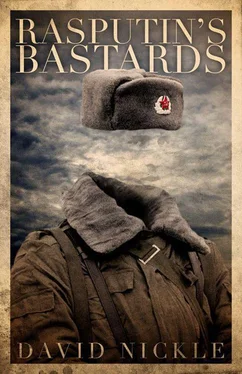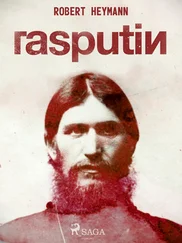To Kolyokov, who had first swum in its briny middle three decades ago, it merely smelled… comfortable.
For the last of those decades, the isolation tank had gathered dust in a large storage locker in New Jersey. During that time, Kolyokov never visited — not in person. But he kept a watch on it all the same and once a year, he would send a sleeper to see to matters of cleaning and maintenance in person. There would come a day, he was sure, when such things as this tank did not matter to the intelligence community and its existence would no longer need be secret.
In 1997, with the Soviet Union half a decade in the grave, Kolyokov deemed that day to have arrived.
So now, the tank occupied most of the en suite bath to Kolyokov’s rooms on the Emissary’s 19th floor. The bath had at one time contained an immense Jacuzzi tub set in pink marble. But that luxury had been sacrificed to make room, so the tank had only to share the space with a low-flow toilet and a shower stall.
The floor was a thick slab of concrete underneath the tile, but Kolyokov had wished to take no chances and so had constructed a second floor, just inches above the original. It was more of a platform, really, made to distribute the tank’s immense weight beyond its own dimensions.
The platform creaked as he placed a bare foot upon it now. Kolyokov was still groggy from shattered REM sleep, but he had to piss something fierce. The pissing, he thought, was why the dream had gone so badly. The reason that it had turned nightmare on him, and driven him awake.
This wouldn’t have happened in the old days. The tank had been fitted with an assembly from the old Soyuz spacecraft — but the pump had failed years ago.
So Kolyokov hopped on one foot and the other, bladder twisting and wringing as he moved. He splashed brine all over the bathroom’s two floors, as he made his way around the tank to the toilet. A thick stream of urine made a roar in the bowl that was deafening to Kolyokov’s silence-calmed ear.
The door to the bathroom slid open as Kolyokov was finishing. He looked over a shoulder.
It was of course Stephen — his helper, his prize, and his great secret, Stephen Haber — who had been attending in the sitting room since the operation began. When was it? Kolyokov glanced at the wall clock. Thirteen hours ago. Just thirteen hours.
“Sir? Everything all right?”
Kolyokov sneered. “If everything were all right,” he spat, “I would be still inside. I would know what was happening to my people. I would not be pissing in a toilet when there was work to be done.”
“A bad dream,” said Stephen with a little grin.
“Hah.” Kolyokov shook himself off and moved back to the open hatch of the tank. He sat down on its rim and regarded Stephen. “Have you received any word?”
Stephen frowned. “Me? Oh. You don’t mean over the phone?”
“Yes. By telephone, by fax, some e-mail. Anything?”
Stephen’s eyes widened. “Shit,” he said. “You did have a bad dream. You lost the scent, didn’t you?”
What a little shit , thought Kolyokov. That’s what a lifetime in America does for you — a couple of decades of MTV and situation comedies and rap music turns you into a smart-assed little shit like Stephen. Not even good, purebred parents make a difference .
Kolyokov had only found Stephen two years ago after looking up those parents. The two of them had been on the lam for nearly three decades, after the Weather Underground cell they’d infiltrated had broken up in ’72. His search had ended not with them — they’d died in ’91, in an unfortunate police standoff at a rented house in Michigan — but with Stephen, their only son, who had been living on the streets and turning tricks in Manhattan since he was twelve.
The parents had done their job, he supposed. Kolyokov could use Stephen and even trust him — despite the matter of his obstinate mind. But there was enough of America in him — including a dangerous amount of heroin that was easily expunged, and a percolating dose of HIV that wasn’t — to make the young man something of an annoyance; much more so, certainly, than the farm-bred boys and girls he’d worked with over the years in City 512.
“Dogs pick up a scent,” said Kolyokov. “Are you calling me a dog?”
“No,” said Stephen. “You’re not a dog. You lost the scent all the same, though.” He smirked. “Have to show me your tricks some time. Before it’s too late.”
Kolyokov ducked back into the tank. “You spend enough time sleeping,” he said. “Check the fax machine.”
Stephen came over to the hatch. He leaned on it. “Something happened,” he said. “I can see it in you. Tell me what it is. Did the ocean get you?”
“No. I know better.” Kolyokov squinted at the circle of light as he sloshed back into the brine. “I lost the Goddamn scent,” he said. “I had to piss. Don’t you ever have to piss, boy?”
Stephen shrugged, and lifted the hatch cover over the light. And it was dark again. Kolyokov took a breath of the dank air in the tank. And he began to sleep.
For someone else with Kolyokov’s problem, falling asleep would be a problem; restlessness would intervene and the night would stretch from minutes into an eternity. But as a rule, Kolyokov didn’t fall asleep. Sleep was his avocation — and the word “fall” implied a clumsiness, a lack of forethought — an amateur mistake. Kolyokov approached sleep methodically. “Red,” he whispered. “And orange and yellow. And green, and blue…”
And with the words, his eyelids fluttered shut, his breathing slowed, the spectrum flashed through his mind. The water numbed his flesh, and then all other sensation in his body was gone. There was a familiar rushing feeling, as of a body moving swiftly through a tunnel of chilled air. At the end of it, Kolyokov looked upon a brilliant, stratospheric light.
A less experienced dream-walker might have imagined himself dead — staring at the brilliance of his Creator, waiting to welcome him into the glories of the afterlife. But Kolyokov had been around long enough to tell the difference between Heaven and seven thousand feet. He rotated his gaze from the sun, and looked down through thinning clouds, at the grey-green waves of the Atlantic.
The fogbank was the last thing he’d seen before being driven out of his dream. It was still there. It had grown in fact — now it squatted on the ocean like a pus-whitened sore, miles across.
It was not a real fog, though. Kolyokov could see through a real fog, at least well enough to find his people and move in them. This one was as impervious as lead.
Kolyokov took a breath, and let himself descend to its crown. The last time he had tried to penetrate the dome, he had done so without preparation — he had underestimated its strength.
And so it had thrown him from sleep, left him bug-eyed and shaking in his tank, clenching his bladder and gasping like an old man at the top of a stairway.
This time, he would prepare himself for the descent. He would not underestimate his opponents again.
So Kolyokov began to study the fog. As he did so, he began to apprehend certain flaws in its camouflage. It was white, but it was a white too pure — it bore no shadow, even though the cloud overhead was beginning to break and yellow sun was punching through. While wisps of vapour came off the fog, as Kolyokov studied it more closely he saw that by and large the vapour clung to it, as though made from a solid dome of dry ice. He fell slowly towards it, thinking that this was what the form of the fog must in fact be: a solidified dome — solidified to beings such as himself, that is — covering an area of the Atlantic of perhaps a dozen square miles.
Kolyokov laughed to himself. An old trick, that. It was the same thing he used on the hotel; the same thing the others had used on Petroska Station, to hide when hiding was needed, all those decades ago. But this one — this was the true thing that the Party had hoped for: a dome of psychic energy that would cover Moscow, so powerful that spy satellites would be confounded by its opacity and ICBMs would bounce off its hardy surface.
Читать дальше












